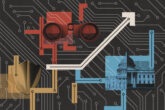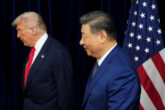January 26, 2022
‘Web3’ Is on the Way. Authoritarians Should Be Worried.
The Internet once held great promise as a means of empowering individuals, but it has become yet another path of control for bad actors. Today, authoritarian governments and companies around the world track and surveil individuals; data is not private and is sold for profit; some states algorithmically “score” their citizens; and propaganda and disinformation are rampant.
Thankfully, we are on the cusp of “Web3,” a next-generation Internet that could shift the balance back toward individuals.
If the United States embraces Web3, it could also offer a pivotal advantage in its ongoing competition with authoritarian states, especially China.
What is Web3? To understand, it helps to go back to the beginning.
Think of Web1 as the original one-way Web pages of the 1990s — static sites coupled with the dawn of widespread email. Web2 came to life as the Internet became interactive, allowing users to log in and create their own content. At the same time, Google, Facebook and other massive tech platforms hosted “free” services in exchange for our data. Over subsequent decades, of course, the Internet has continued to advance and grow more sophisticated, but we mostly still operate in a Web2 world.
Now, we are closing in on a new version of the Internet — Web3 — built on the blockchain, a technology that makes it possible to transact data securely, and smart contracts, which allow users to make agreements without relying on intermediaries — it’s what permits you to pay a vendor directly using cryptocurrency, no bank required. Web3 is still being developed and defined, but it’s clear that, fundamentally, it will offer a more decentralized version of the Internet.
Read the full article from The Washington Post.
More from CNAS
-
Transatlantic Security / Technology & National Security
Look Before We Leap on Artificial IntelligenceThis article was originally published on The Dispatch. A debate about the role that artificial intelligence should and will play in society, and how it will affect humanity fo...
By Jon B. Wolfsthal
-
Technology & National Security
Caleb Withers on the Cybersecurity Frontier in the Age of AICaleb Withers, research associate at the Center for a New American Security, joins Kevin Frazier, the AI Innovation and Law Fellow at the University of Texas School of Law and...
By Caleb Withers
-
Technology & National Security
Prepared, Not ParalyzedExecutive Summary The Trump administration has embraced a pro-innovation approach to artificial intelligence (AI) policy. Its AI Action Plan, released July 2025, underscores t...
By Janet Egan, Spencer Michaels & Caleb Withers
-
Indo-Pacific Security / Technology & National Security
Sharper: Tech + ChinaRecent talks between President Donald Trump and Chinese Communist Party General Secretary Xi Jinping placed a spotlight on emerging technologies, from high-end chips to minera...
By Charles Horn & Sevi Silvia




